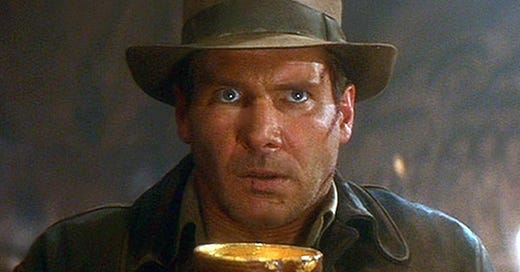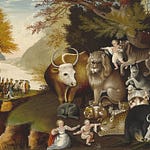When I was a child, few movies captured my imagination like the Indiana Jones series. Indy was everything I wanted to be—an adventuring scholar, at home equally in a library or a jungle; a good guy with a gruff edge. I saved my money, bought myself a felt fedora and a whip, and set off into the woods in search of adventure. I didn’t discover the Ark of the Covenant or escape ancient booby traps, but I did find a few old bottles and a cobbled leather shoe—exciting enough fare for a nine-year-old.
Perhaps it was a sense of nostalgia for that excitement that led me, on a night when my family was away, to sit down to dinner and watch my favorite film in the series: Indiana Jones and the Last Crusade.
For those who don’t remember or have had the misfortune of never seeing it, Indiana Jones and the Last Crusade traces Dr. Jones’s adventures in search of the Holy Grail, all the while battling Nazis and encountering the supernatural despite his skepticism.
In one of the early scenes of the film, Jones is discussing the Grail with his colleague Marcus Brody. Jones is skeptical about the Grail legend which he takes to be little more than a Medieval fairytale. Brody responds that, "The search for the cup of Christ is the search for the divine in all of us. But if you want facts, I have none to give you. At my age I'm willing to take a few things on faith.”
Brody’s response is a wise one, one that names, perhaps, the reason for the long and flourishing tradition of Holy Grail stories, from L’morte de Arthur to Monty Python. We all want to understand our relationship to the divine and so the grail legend has been a vehicle for us to explore this mystery in the best way human beings know how: through stories. With the grail on my mind, I began to work through a problem I’ve been pondering, the problem of the Ascension.
Creation, incarnation, resurrection—these are essentials for our understanding of God in Christ and each has a great resonance for me. Part of the reason Christianity has remained my faith and practice is because of our profound belief that God created the world and redeemed it by becoming a part of creation, suffering inside of it, and opening the way for new life within it through resurrection. But the Ascension has always been a hard reality for me because it seems to be moving in the opposite direction. The Ascension appears to say that Christ was simply a visitor to earth, like some alien from a spaceship, who doesn’t belong here and so has left us for a better place, like a big shot who gets stuck in coach on an airplane and is quickly ushered to first class by an apologetic flight attendant.
To put it more theologically, how do we make sense of Christ’s promise in the Gospel of Matthew to be with us always, even until the end of the age, when it seems that in the Ascension Christ has clearly abandoned us, albeit under the divine care of the Holy Spirit? How is it, as Ephesians puts it, that Christ who is seated at the Father’s “right hand in the heavenly places” is also the one “who fills all in all” (Ephesians 1:15-23)?
I found help for my questions in a wonderful essay by the exiled Russian theologian Sergei Bulgakov (1874-1944). Bulgakov takes up the quandary of the Ascension and solves it by drawing on the tradition of the Holy Grail with a brilliant twist. The Holy Grail tradition, of course, is that the cup Christ drank from at the last supper was then given to Joseph of Arimathea who used it to catch the blood and water that spilled from Christ’s side when he was pierced on the cross. Legend has it that Joseph then took the Grail to England where it was hidden and became sought after by such great knights as Sir Galahad of the King Arthur’s round table.
These are legends of course, but Bulgakov draws on these legends to say something profound. “The image of the Holy Grail, in which the holy blood of Christ is kept,” he writes, “expresses precisely the idea that, even though the Lord ascended in His honorable flesh to heaven, the world received His holy relic in the blood and water that flowed out of his side...And the whole world is the chalice of the Holy Grail.”
The world is the Holy Grail! This means that though Christ has ascended in body, his life blood is also still here. In the Incarnation and his sacrificial death, Christ became so mixed with the creation that the world is now infused with Christ, filled like a cup with his life. “Through the precious streams of Christ’s blood and water that flowed out of His side,” writes Bulgakov, “all creation was sanctified--heaven and earth, our earthly world, and all the stellar worlds.” This means, he writes, that “The world has become Christ.”
And if the world has become Christ, this changes everything about how we understand the Ascension. We can begin to make sense of how Christ can be seated at the right hand of the Father and still be embodied in the church and the world, filling all in all. In the Ascension Christ does not leave us, but instead, just as he is the “first fruits” of the resurrection, he has Ascended to begin the motion that all of his body will join and follow, until earth becomes heaven and heaven earth.
We all have the opportunity, then, to become like the nights of the round table or Indiana Jones. We too can go on a quest for the grail. To begin our search we do not need chain mail or a fedora. We only need the eyes to see the sacred reality of Christ all around us—this sacred world in which Christ is present and also drawing us to our fullness. When we drink from this grail its miracle will be our own transfiguration, our bodies becoming his body, earth becoming heaven, his descent becoming our ascension into the divine.
This Feast of the Ascension then becomes a day on which we glory in what Christ has become and seek to welcome that becoming into the world, saying to all the powers of Death, all the pretended rulers of the earth, that Christ is not only resurrected but also ascended, abiding on earth and ruling in heaven until both are joined through his love.















Share this post